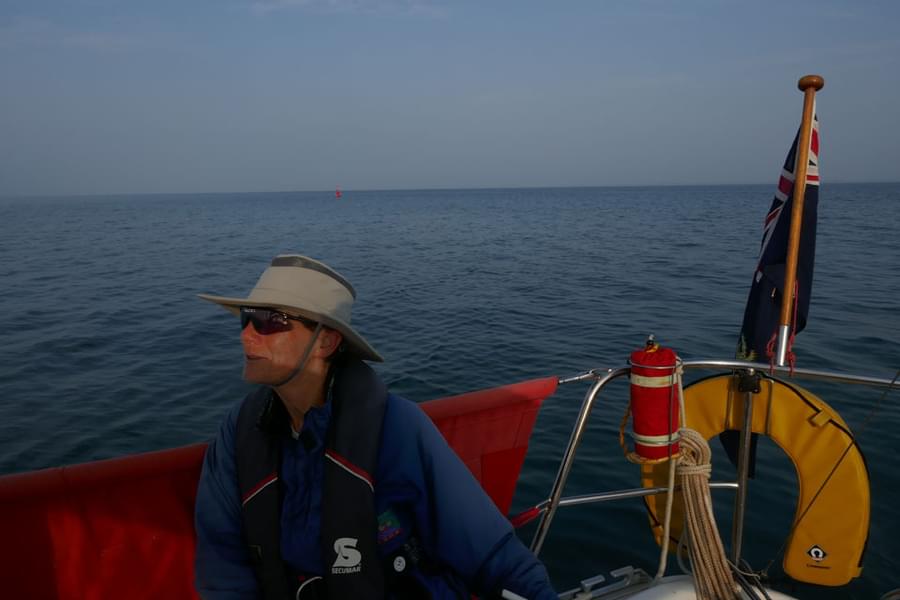In June 2021, we launched our exciting new ORCA OceanWatchers programme, which allows us to continue our vital work in monitoring important ocean habitats
The ORCA OceanWatchers project is centred around our incredible bespoke app, which allows anyone, anywhere, to collect data on whales, dolphins and porpoises. We also developed a training course to compliment the app, which trains participants to collect effort-based data about whales, dolphins and porpoises at any time, anywhere they can see the sea. Since launching the programme, we have been delighted to see hundreds of ORCA OceanWatchers collecting data from cruise ships, on coastal walks and even from their own boats!
Existing ORCA Marine Mammal Surveyors Dennis and Anne Kell completed their ORCA OceanWatchers course at the beginning of 2021 and since then have been enjoying using the app and collecting data whilst sailing around the UK. Here they talk about their experiences.
“We completed our Marine Mammal Surveyor training at the start of the year, expecting Covid restrictions to disappear as the year wore on. How wrong we were. However, the launch of the ORCA OceanWatchers app provided an opportunity to try out our newfound skills at sea as we are lucky enough to own a small sailing boat, “Redshank”.
Based in Suffolk on the River Orwell, we are able to sail south toward Essex or across the Thames Estuary toward Kent and the south coast. We can also sail north toward Norfolk, the Wash and beyond. Our ambition is to try and circumnavigate the British Isles at some point in the future, hopefully being able to take our time and explore the country as we go.
Once allowed out over the summer, we made several trips south, including one that took us up the tidal Thames into the heart of London, berthing in St.Kathrine’s Dock beside Tower Bridge. On these trips, we began to try using the ORCA OceanWatchers app. At first, it took us a little while to settle into a routine to try and establish a consistent approach to our observing whilst still sailing the boat. Visibility ahead is restricted by the sail, and our viewpoint is very close to the water. We had a few email conversations with the ORCA Office to establish that what we were doing was acceptable. But we settled into a comfortable pattern with Anne at the helm and myself checking the navigation as we kept a close watch from our fairly low vantage point.
It was on a passage along the Wallet, off Clacton, near the Gunfleet wind farm, that we had our first sighting. It was a lone harbour porpoise (Phocoena phocoena) passing in the opposite direction, fairly close to the boat. Our surveys generally lasted for one hour before we took a rest. Often, after a short break for a brew, trimming the sails and checking our position, we could start another survey fairly soon. Sometimes, the weather changed quickly, increasing the swell and making observation difficult so close to the water, and we stopped after an hour to focus on the sailing.
During the summer, we were lucky enough to be able to sail ”Redshank” north to Lowestoft, then make the long passage around north Norfolk to Wells-next-the-Sea, before spending time in the Wash amongst its sandbanks and visiting harbours at Brancaster, Kings Lynn on the River Great Ouse and Fosdyke on the River Welland. It is a wonderful area to see both common and grey seals as well as seabirds like gannet, guillemot and common scoter. We had one lovely view of a harbour porpoise with a calf but sadly were not on a survey at the time.
By the end of the summer, we had recorded one further harbour porpoise in the River Blackwater estuary, despite seeing several more at other times when not surveying. In total, we spent twenty-one and a half hours on survey once we got going. We have to learn to appreciate the value of negative data.
We have really enjoyed our first year using the app and look forward to doing more in the future. The training course was very empowering - even to two technophobes like us, as well as good fun. Hopefully, we shall see more cetaceans whilst surveying in the coming year and perhaps more species as we travel a little further afield.
Thanks for the opportunity, ORCA.”
Dennis and Anne Kell
Suffolk
This year we have three OceanWatchers courses taking place, and all you need is a passion for whales and dolphins to get involved! Visit the ORCA website to find out more and get involved.

